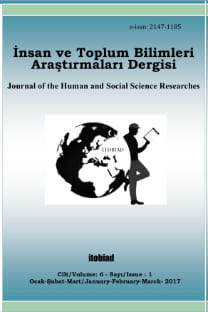Gana’da Hane Halkının Fakirliğinde Düşüşe Doğru: Kuzey Gana Eyaleti Bongo’da Kadının Rolü
Ekonomik Rol; Aile; Fakirlik; Gelir; Geçim; Kadın
Towards Household Poverty Reduction in Ghana: The role of Women in the Bongo District of Northern Ghana
___
- Aili, M. T. (2000) Women and Politics in Uganda. Fountain Publishers, Kampala.
- Ardayfio-Schandorf, E. (2004) Bridges of Development: A Compendium of Gender and the Ghanaian Family. Woeli Publishing Services, Accra.
- Ardayfio-Schandorf, E. and Kwafo-Akoto, K. (1990) Women in Ghana: An Annotated Bibliography. Woeli Publishing Services, Accra.
- Awumbila, M. (2001) Women and Gender Equality in Ghana: A Situational Analysis. In D. Tsikata (Ed.), Gender Training in Ghana: Politics, Issues and Tools (pp. 33-57). Woeli Publishing Services, Accra.
- Ayikwei, V. K. (2005) The Ghanaian worker: Mouthpiece of the Ghana Trades Union Congress, 28, first Quarter.
- Bongo District Assembly (2006-2009) Medium Term Development Plan: Under the Growth and Poverty Reduction Strategy (GPRS II).
- Dolphyne, F. A. (2000) The Emancipation of Women: An African Perspective. Ghana Universities Press, Accra.
- Ellis, A., Cutura, J., Dione, N., Gillson, I., Manuel, C. & Thongori, J. (2007) Gender and Economic Growth in Kenya: Unleashing the Power of Women. World Bank.
- ILO (2008, April) World of Work: The Magazine of the International Labour Organization (62).
- -
- MOWAC Report (2004) Gender and Children and Early Childhood Development Policies. Modules Publications, Accra, Ghana.
- Murphy, J. L. (1995) Gender Issues in World Bank Lending: A World Bank Operations Evaluation Study, USA.
- Opoku-Yeboah, D. (2006) The Impact of the HIPC Funds and Projects on the Life of Beneficiary Communities in the Cape Coast Municipality, Unpublished Dissertation.
- Owusu, G. and Lund, R. (2005) ‘The Role of Market Women in Rural-Urban Linkages in Ghana: A Case Study of Two District Capitals and their Hinterlands’: Legon Journal of Sociology, 2 (2), June/Dec. 2005.
- Population Reference Bureau (2002) “Women of Our World”. Washington DC, USA.
- World Bank (2005) Mini Atlas of Millennium Development Goals: Building a Better World.
- ISSN: 2147-1185
- Yayın Aralığı: 4
- Başlangıç: 2012
- Yayıncı: Mustafa SÜLEYMAN ÖZCAN
Sosyo-Ekonomik Yapı ve Dünya Görüşü Bakımından Pakistan Medreselerinde Öğrenci Profili
E-Commerce Promotion in the New Economy: Interrogating the Missing Links in Nigeria
Yaşlılık Döneminde Dini Başaçıkma
Satış Sonrası Piyasalarda Rekabet Politikası ve Kodak Kararı
Otuz Yılın Ardından "Bilginin İslamîleştirilmesi": Temellere Dönüş
Yetişkinlerde Dindarlık ve Ruh Sağlığı İlişkisinin Çeşitli Değişkenlere Göre İncelenmesi
Yeni Ekonomide E-ticaretin Yükselişi: Kayıp Halkayı Nijerya’da Bütünlemek
Moğol İstilasında Halife Nâsır li-Dinillâh'ın Rolü
Klâsik Türk Şiirinde Kadın Söyleminin İzinde: Şeref Hanım Dîvânı'nda Ninniler
